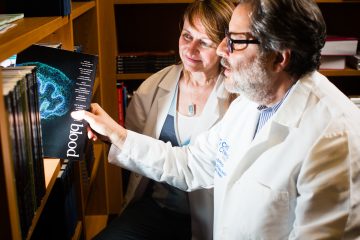
Dr. Jose Abdenur, chief of the division of metabolic disorders and director of the metabolic laboratory at CHOC, will serve as the director of the NORD Center of Excellence partnership.
Children’s Hospital of Orange County (CHOC) and University of California, Irvine (UCI) Health have been jointly designated a National Organization for Rare Disorders (NORD) Rare Disease Center of Excellence, joining a new and highly select group of 31 medical centers seeking to expand access and advance care and research for rare disease patients in the United States.
The NORD Center of Excellence program aims to foster the sharing of knowledge between experts across the country, connect patients to appropriate specialists regardless of disease or geography, and improve the pace of progress in rare disease diagnosis, treatment, and research.
Dr. Jose Abdenur, chief of the division of metabolic disorders and director of the metabolic laboratory at CHOC, will serve as the director of the NORD Center of Excellence partnership. He will work closely with Dr. Virginia Kimonis, tenured professor in the Division of Genetic and Genomic Medicine in the Department of Pediatrics, with appointments in neurology, pathology and medicine at the UCI School of Medicine.
“Receiving this designation will increase our visibility, but more importantly, will increase access to many rare disease patients who may not know where to go,” said Dr. Abdenur, whose division is involved in more than 30 clinical trials. “Working together with UCI, we can improve clinical care and research for patients of all ages and backgrounds in Southern California, and collaborating with other NORD Centers of Excellence is a great opportunity to deliver transformational changes for the rare disease community.”
Dr. Kimonis is one of several UCI faculty members who provide genetics services at UCI, CHOC and Miller Children’s and Women’s Hospital Long Beach. Her lab at UCI has been a consistent trainer of the next generation of bench and clinical researchers studying rare and undiagnosed diseases, with a focus on rare neuromuscular disorders. She believes that UCI’s strength in research has the potential to advance translational breakthroughs in several rare diseases.
“Genetics has been a Cinderella specialty, with very little investment in rare diseases. However, insights gained in understanding rare diseases has led to several treatment breakthroughs, which has also benefitted common diseases,” said Dr. Kimonis, who for many years has been working on research related to rare genetic diseases including mitochondrial and muscle disorders. “Hopefully this designation will attract more resources and recognition, with the potential to find novel cures for rare disorders.”
Meeting the challenge
People living with rare diseases frequently face many challenges in finding a diagnosis and quality clinical care. In establishing the Centers of Excellence program, NORD selected clinical centers across the U.S. that provide exceptional rare disease care and have demonstrated a deep commitment to serving rare disease patients and their families using a comprehensive, state-of-the-art approach.
CHOC and UCI were selected by NORD in a competitive application process requiring evidence of staffing with experts across multiple specialties.
Most rare diseases are diagnosed in the pediatric population, but many remain unrecognized until adolescence or adulthood. CHOC is one of the few pediatric hospitals in the country with a Metabolic Rare Disease Program, conducting basic, translational and clinical research in lysosomal storage disorders, glycogen storage diseases, mitochondrial diseases, phenylketonuria and other rare metabolic conditions.
With the support of research administration, multiple other specialties perform basic and translational research to provide new solutions for rare forms of blood disorders, hydrocephalus, epilepsy, brain tumors, ulcerative colitis, muscular dystrophies, neurodegenerative disorders, leukemias, cystic fibrosis, hormone deficiencies, and other diseases.
Faculty members in UCI School of Medicine’s Division of Genetic and Genomic Medicine work closely with faculty in perinatology, neurology, medicine, cardiology and other departments and are actively involved in clinical, translational, and basic science research to develop leading-edge therapies for rare diseases that extend into adulthood. Rare diseases studied at UCI include inclusion body myopathies, other neuromuscular disorders, Prader Willi Syndrome, rare tumors, rare eye diseases, as well as lysosomal, mitochondrial, ataxias, and other disorders.
Setting the standard
Any disease that affects fewer than 200,000 people in the U.S. is considered rare, according to the National Institutes of Health. There are more than 7,000 rare diseases and between 25 million and 30 million Americans are estimated to be currently living with rare diseases. More than 90% of rare diseases lack an FDA-approved treatment.
“Right now, far too many rare diseases are without an established standard of care,” said Ed Neilan, chief scientific and medical officer of NORD. “The Centers for Excellence program will help set that standard – for patients, clinicians, and medical centers alike. We look forward to many further contributions from CHOC and UCI as we collectively seek to improve health equity, care, and research to support all individuals with rare diseases.”
Dr. Abdenur will serve as a representative on the NORD Center of Excellence Advisory Committee.
“My goal is to highlight the importance of both CHOC and UCI,” Dr. Abdenur said. “I will try to make sure that we capitalize on our strengths and conduct more clinical trials as we move forward.”
Dr. Kimonis said the NORD designation is a “wonderful and important opportunity” for CHOC and UCI Health to work together and build on each other’s strengths in finding creative ways to help patients with one of the 7,000 rare diseases with no treatment currently available.
“This is absolutely a fantastic way forward for both institutions,” she said. “I’m very excited.”
CHOC and UCI’s new NORD designation will last for three years, after which the partner institutions will re-certify to meet the most up-to-date designation criteria.
For more information on the NORD Rare Disease Centers of Excellence program and the full list of centers, visit the program website.











